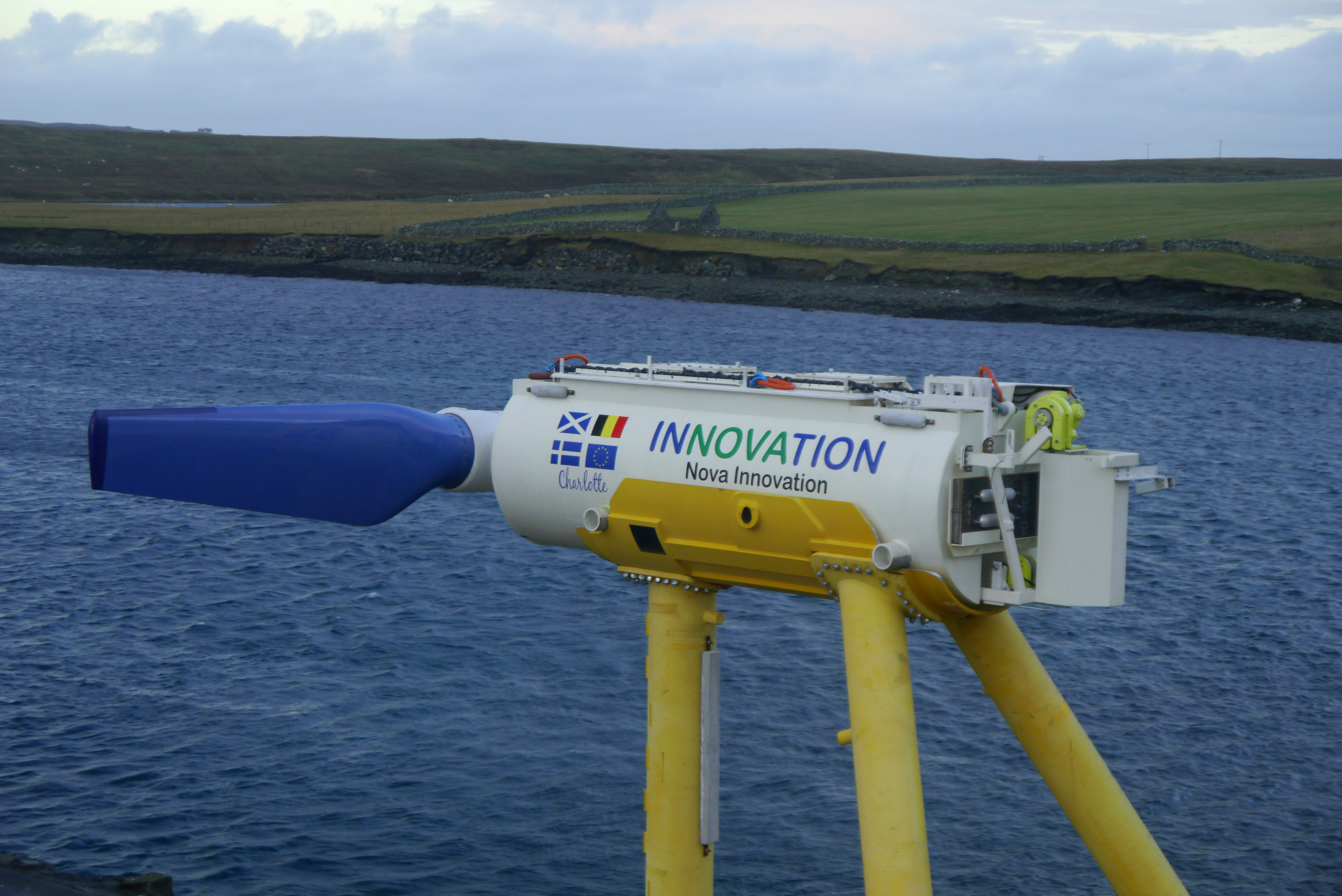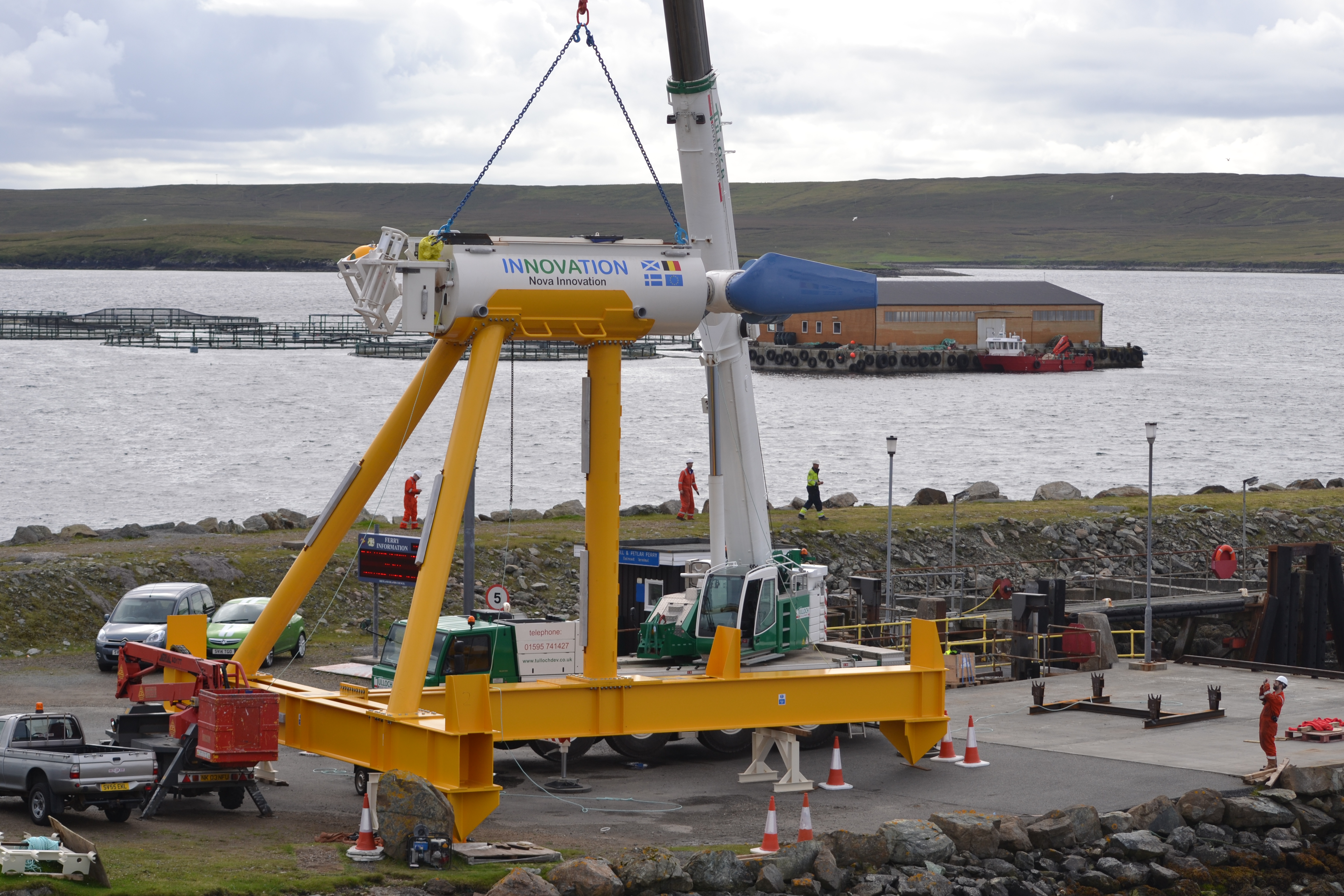Nova Innovation wins €5 million European tidal project
 © Nova Innovation
© Nova Innovation 17.05.2019
Scotland-based tidal energy leader Nova Innovation is leading a consortium that has won a major new European project, ELEMENT, that will use Artificial Intelligence to improve tidal turbine performance and accelerate commercialisation of tidal energy.
Artificial Intelligence has already been successfully deployed in the mature wind industry to deliver significant commercial benefits by allowing turbines to adapt continually to changing conditions. The ELEMENT project will incorporate state-of-the-art Artificial Intelligence technology from wind energy into tidal turbines to deliver an adaptive control system that improves turbine performance; slashing the lifetime cost of energy by 17% and driving the tidal energy sector to commercial reality.
Nova Innovation heads a consortium of 11 leading industrial, academic and research organisations from across Europe. Joining Nova in the project team are IDETA, Chantier Bretagne Sud, Innosea, Wood, Nortek AS, The University of Strathclyde, DNV GL UK, France Energies Marines, Offshore Renewable Energy (ORE) Catapult and ABB UK.
The control technology will be demonstrated on a floating tidal device in the Étel estuary in Brittany and on a seabed-mounted Nova M100 turbine in the Shetland Tidal Array.
The €5 million project starts in June 2019 and runs until May 2022. It was won as a competitive contract awarded by the European Union’s Horizon 2020 research and innovation programme. The 100% funded project will help to maintain Europe’s global leadership in marine energy while driving down the cost of this emerging technology sector.

Simon Forrest, Chief Executive Officer of Nova Innovation, said:
“Reliable tidal energy generation is now a reality. It is no longer a matter of “if”, but “when” the technology becomes mainstream. The sector has taken great strides forward in recent years and our drive is now to reduce cost to compete with conventional generation.
Fortunately for our industry, many cost reduction techniques have already been demonstrated in established renewable technologies, such as offshore wind. By capturing this knowledge, we can reduce the costs of tidal energy more quickly by piggybacking on their technological advances.
The EU has a clear global lead in tidal energy. Nova Innovation is playing a leading role in making tidal energy part of the global energy transition.”
Olivier Bontems, Director at IDETA, said:
“Within this project, IDETA will conduct a socioeconomic assessment of the potential impact of estuary, river and tidal energy at the regional, national and EU level.
As a regional development agency for Picardy Wallonia’s, IDETA has prioritised increasing renewable energy sources and improving energy efficiency. IDETA has extensive project development experience with a focus on community involvement to maximize local use of green energy. The empowering of citizens is a regulatory principle which presents a lot of advantages such as improving public acceptance, promoting local and collective self-consumption and increasing flexibility of the energy market. It is also a way to improve the integration of intermittent energy on the public grid.”
Yann-Hervé De Roeck, Chief Executive Officer of France Energies Marines, said:
“France Energies Marines is very proud of supporting tidal energy development since 2012, with more than 20 R&D collaborative projects related to this promising technology, including the current ELEMENT project. Testing of the Nova turbine in the Ételriver in order to develop an innovative control technology is of major importance for French tidal energy deployments. Our institute will contribute to assess the environmental integration of tidal energy devices by measuring physical as well as biological characteristics at the Ételtest site. This will be followed by developing indicators that will be used in continuous monitoring in order to reduce the potential environmental impacts of offshore renewable energy.”
This project has received funding from the European Union’s Horizon 2020 research and innovation programme under Grant Agreement No 815180. The project has been awarded under call H2020-LC-SC3-2018-2019-2020, topic LC-SC3-RES-11-2018 – Developing solutions to reduce the cost and increase performance of renewable technologies.

